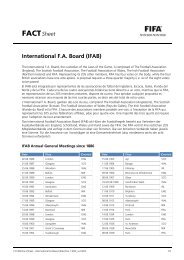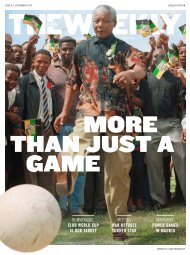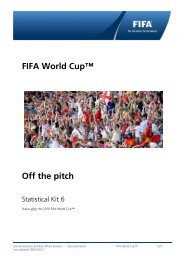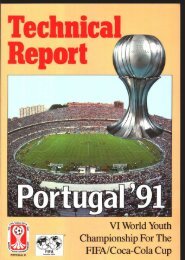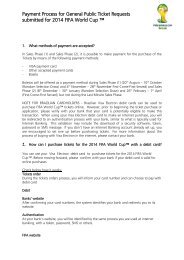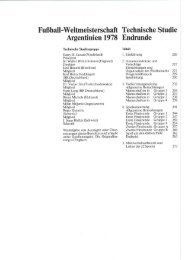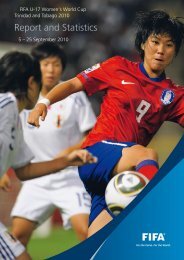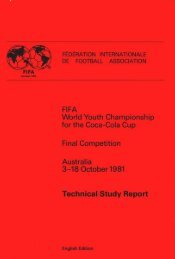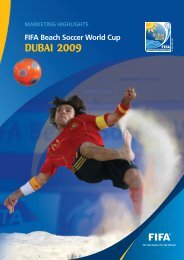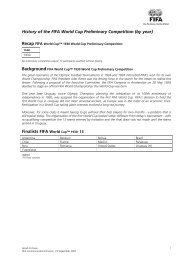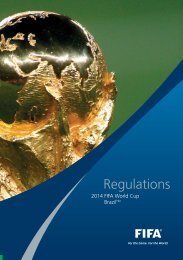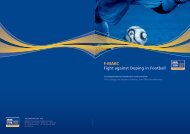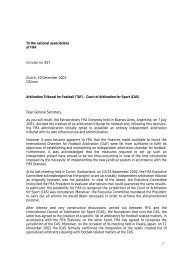MINUTES - FIFA.com
MINUTES - FIFA.com
MINUTES - FIFA.com
Create successful ePaper yourself
Turn your PDF publications into a flip-book with our unique Google optimized e-Paper software.
<strong>MINUTES</strong> OF THE 63 RD <strong>FIFA</strong> CONGRESS, MAURITIUS 2013 33<br />
The President of the Canadian Soccer Association,<br />
Victor Montagliani, informed the Congress that his<br />
confederation, CONCACAF, through the leadership of<br />
its President and <strong>FIFA</strong> Vice-President Jeffrey Webb, had<br />
vigorously started its own reform process and would<br />
continue in the relentless pursuit of governance reform<br />
within the confederation for the sake of the game. He<br />
applauded the President for his leadership in getting<br />
the reform process within <strong>FIFA</strong> under way and urged<br />
the members to take a leadership role in undertaking<br />
governance reforms in their own football associations,<br />
saying that leadership did not only have to flow from<br />
the top down, but also from the bottom up and the<br />
purpose of leadership was service, not power.<br />
Victor Montagliani concluded by highlighting the<br />
watershed moment they would all be a part of that<br />
day by electing the first female member of the <strong>FIFA</strong><br />
Executive Committee. On behalf of the confederation,<br />
he applauded <strong>FIFA</strong> for making that moment possible<br />
as well as the courage of the women who had stood<br />
for election.<br />
13. VOTE ON PROPOSALS<br />
for amendments to the <strong>FIFA</strong> Statutes, Regulations<br />
Governing the Application of the Statutes and Standing<br />
Orders of the Congress<br />
Chairman of the Task Force Revision of Statutes Dr Theo<br />
Zwanziger began by highlighting the extent to which<br />
<strong>FIFA</strong> and football had evolved since the organisation’s<br />
founding in 1904 and said that nowadays, <strong>FIFA</strong> played<br />
an important social role through its development work<br />
in youth football and was therefore an important<br />
part of society. He said that changes in society and<br />
changes in football conditioned each other, making it<br />
therefore necessary to be prepared to carry out reform<br />
regularly. He emphasised the fact that the Statutes now<br />
contained a clear provision on racism to help in the<br />
fight against racism and discrimination and also pointed<br />
to the inclusion of girls and women in football, which<br />
enhanced the sport and was good for society the world<br />
over. He said that institutions became more credible<br />
when their actions were in sync with their promises, and<br />
explained that the current reform process was putting<br />
systems in place at various levels which would enable<br />
them in future to measure ideals against reality and to<br />
keep their objectives and reality close to each other.<br />
Dr Theo Zwanziger continued by saying that human<br />
beings had strengths and weaknesses and were not<br />
infallible. He gave the example of football, where foul<br />
play on the pitch was detected by the referees, TV<br />
cameras and the spectators and sanctioned accordingly<br />
for the sake of fair play and respect. It was more<br />
difficult, however, to achieve that with people in official<br />
positions within football and for that reason, it was<br />
vital for everyone working in football to stand up for<br />
and <strong>com</strong>ply with their <strong>com</strong>mon aims and objectives<br />
regarding ethical behaviour. He said that with this aim<br />
in mind, <strong>FIFA</strong> had devised an integrity check to ensure<br />
that candidates had a clear record and shared <strong>FIFA</strong>’s<br />
ethical values before they took up their positions within<br />
football. In relation to investigating and sanctioning<br />
possible violations <strong>com</strong>mitted by officials, he stressed<br />
that the reform process had enabled <strong>FIFA</strong> to put<br />
independent people in charge of these processes so<br />
that the organisation achieved greater credibility.<br />
He told the members that it had been the correct decision<br />
to submit the decision on the hosts of the World Cup<br />
to the vote of the Congress and explained that the new<br />
procedure, consisting of a tender, the establishment of<br />
specifications for the assessment of the quality of the bids,<br />
and the preparation of a shortlist by the <strong>FIFA</strong> Executive<br />
Committee to be presented to the Congress, would create<br />
greater transparency in that area. With regard to the<br />
Audit and Compliance Committee’s additional tasks of<br />
overseeing remuneration and benefits, he concurred that



